| Srl | Item |
| 1 |
ID:
160805
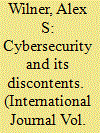

|
|
|
|
|
| Summary/Abstract |
The future of cybersecurity is in flux. Artificial intelligence challenges existing notions of security, human rights, and governance. Digital misinformation campaigns leverage fabrications and mistruths for political and geostrategic gain. And the Internet of Things—a digital landscape in which billions of wireless objects from smart fridges to smart cars are tethered together—provides new means to distribute and conduct cyberattacks. As technological developments alter the way we think about cybersecurity, they will likewise broaden the way governments and societies will have to learn to respond. This policy brief discusses the emerging landscape of cybersecurity in Canada and abroad, with the intent of informing public debate and discourse on emerging cyber challenges and opportunities.
|
|
|
|
|
|
|
|
|
|
|
|
|
|
|
|
| 2 |
ID:
143149
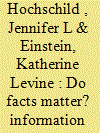

|
|
|
| 3 |
ID:
177020
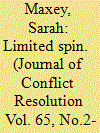

|
|
|
|
|
| Summary/Abstract |
Presidents have significant incentives to mislead the public about the use of force. Under what conditions are members of the public willing to hold presidents accountable for what they say about military action? This article examines both spin and deceit at the micro-level to clarify when individuals are most likely to punish presidents for misinformation. Three survey experiments demonstrate that presidents incur political costs for misinformation, even when operations succeed. Introducing partisanship into the analysis then reveals that not all individuals are equally likely to punish all presidents—Republican leaders primarily concerned with their base have the most leeway to mislead. The findings highlight the dynamic nature of democratic accountability and domestic constraints on military force. Rather than a static institutional feature, the strength of accountability can vary across presidents and electoral coalitions. Additionally, the results show political costs are not limited to large-scale deception—even spin generates backlash.
|
|
|
|
|
|
|
|
|
|
|
|
|
|
|
|
| 4 |
ID:
192611
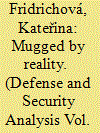

|
|
|
|
|
| Summary/Abstract |
This article discusses the surprising lack of preparedness in Russian propaganda preceding the invasion of Ukraine on February 24, 2022. Despite previous successes in developing strategic narratives during the annexation of Crimea, Russia underestimated the need for unique communication strategies for the conflict in Ukraine. The article argues that Russia's miscalculation was due to the assumption that it already had a set of strategic narratives in place, from the international order to specific issues, and viewed the conflict as a continuation of the story it had already told. However, increased scrutiny from Western media and academia led to a reexamination of assumptions and attitudes towards the region. Instead of Russia adapting its strategic narrative for a Western audience, it fell back on the existing one, further alienating the audience. This chapter highlights the importance of strategic narrative in international conflicts and its complex relationship with audience perception.
|
|
|
|
|
|
|
|
|
|
|
|
|
|
|
|
| 5 |
ID:
163098
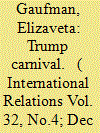

|
|
|
|
|
| Summary/Abstract |
This article argues that a Russian analytical paradigm of carnival culture can help explain the successful presidential campaign of President Donald J. Trump. Russian philosopher and literary critic Mikhail Bakhtin developed the notion of carnival culture while analyzing Francois Rabelais’ work and its connection to the popular culture of Renaissance. Carnival ethos stood in opposition to the ‘official’ and ‘serious’ church sanctioned and feudal culture, by bringing out folklore and different forms of folk laughter that Bakhtin denoted as carnival. Carnival culture with its opposition to the official buttoned-up discourse is supposed to be polar opposite, distinguished by anti-ideology and anti-authority, in other words, anti-establishment – the foundation of Trump’s appeal to his voters. This article examines the core characteristics of carnival culture that defined Trump’s presidential campaign from the start.
|
|
|
|
|
|
|
|
|
|
|
|
|
|
|
|
| 6 |
ID:
176133
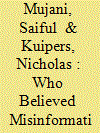

|
|
|
|
|
| Summary/Abstract |
We present findings from eight nationally representative surveys conducted during the 2019 Indonesian presidential campaign, in which we measured voters’ reported belief in prominent pieces of misinformation. Younger, better-educated, and wealthier voters were more likely to believe the misinformation. These results are true for stories about both the incumbent (Joko Widodo) and the challenger (Prabowo Subianto). These findings represent a significant departure from results in Western Europe and North America, where a surge in misinformation has disproportionately targeted older and less educated voters.
|
|
|
|
|
|
|
|
|
|
|
|
|
|
|
|